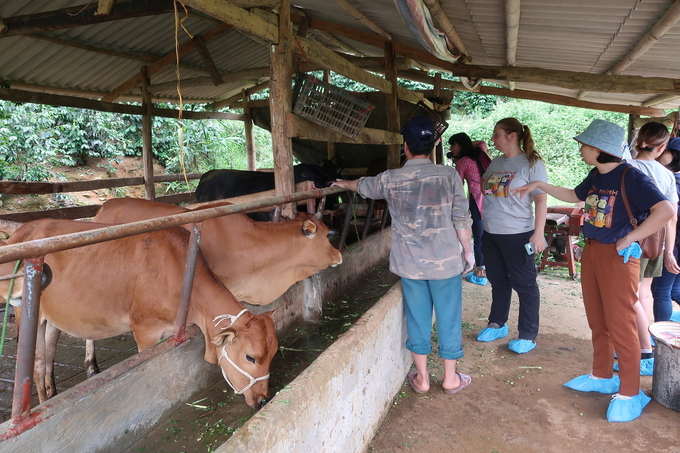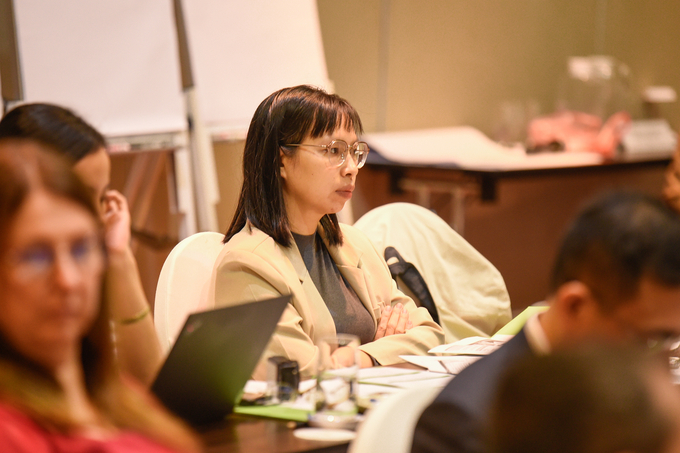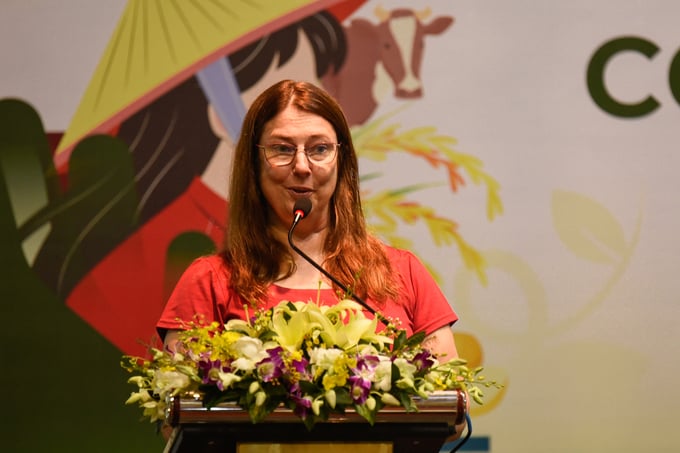November 21, 2025 | 00:18 GMT +7
November 21, 2025 | 00:18 GMT +7
Hotline: 0913.378.918
November 21, 2025 | 00:18 GMT +7
Hotline: 0913.378.918
Son La province presents a unique challenge, with ethnic minorities constituting 83% of the population and facing the highest rates of poverty, malnutrition, and gender inequality in the country, as per CGIAR's assessment. The local community's livelihoods are heavily reliant on agriculture, mainly small-scale livestock production.
As of 2021, Son La province boasts a significant livestock population, including 350,000 cattle, 700,000 pigs, and 7 million poultry. Despite these numbers, the livestock sector grapples with challenges such as low productivity and efficiency, ineffective food safety management, and limited access to education and market competition.

SAPLING team visits farms in Mai Son district, Son La province. Photo: ILRI.
Against this backdrop, the Sustainable Animal Productivity for Livelihoods, Nutrition, and Gender Inclusion (SAPLING) project was initiated in the Mai Son and Phu Yen districts to address the prevailing conditions. This initiative strives to elevate livelihoods by augmenting livestock capacity and facilitating market access, aligning with the National Livestock Development Strategy for 2021–2030.
Mai Son district, once the focus of a previous CGIAR project, is characterized by a diverse range of production practices, spanning from grazing and extensive farming to intensive farming. Leveraging the synergy of crops and livestock, the district capitalizes on various economic, social, and ecological conditions. In contrast, Phu Yen district joined the project in April 2022, selected for its abundant food sources, rich resources, sizable livestock herds, well-established infrastructure, and the active support of local authorities.
The Project's scope extends beyond merely enhancing farm productivity in Son La; it actively aids farmers in integrating science and technology into breeding, genetics, animal health, and animal feed practices. This holistic approach empowers small-scale farmers to autonomously manage their livestock systems and explore intensive farming options aligned with a circular economy framework.

Ms. Nguyen Thi Thinh, the coordinator of the Market and Value Chain section of the SAPLING Project. Photo: Quynh Chi.
Ms. Nguyen Thi Thinh, the coordinator of the Market and Value Chain section of the SAPLING Project, shed light on specific activities supporting livestock households. "Farmers often fixate on market prices, which are unpredictable and resistant to change, neglecting the fact that they can exercise control over input costs. Our emphasis lies in establishing livestock farming groups and fostering collaboration among farmer households, guiding them in cost calculation for production," shared Ms. Thinh.
It's noteworthy that Son La farmers are keenly interested in embracing circular economy principles. To meet their expectations, SAPLING plans to introduce models tailored to current local production conditions, such as employing probiotics for composting and utilizing agricultural waste products to optimize production materials. Ms. Thinh emphasized the high receptivity of Son La farmers to the SAPLING project, noting its initial success in imparting knowledge on reducing input costs in livestock farming.
In this region, the practice of allowing grass to grow too old without timely harvesting is common. Farmers often reserve the overgrown grass for periods of feed scarcity, overlooking the optimal nutritional content that grass attains at a certain stage. This oversight hinders the growth of buffaloes and cows, as the mature grass primarily provides fiber, slowing down their development. To address this issue, the Project's agricultural extension officers and scientists work closely with farmer groups to monitor the silage process. They ensure that grass is silaged at the right time and with the appropriate formula, guaranteeing high-quality feed that remains usable for up to one year after the silage process is completed.

Dr. Karen Marshall presents the CLEANED tool. Photo: Quynh Chi.
Furthermore, Dr. Karen Marshall, a scientist from the International Livestock Research Institute, introduced the CLEANED tool in the Mai Son district. CLEANED is a smart environmental impact assessment tool designed to forecast the effects of livestock production on water and soil environments, as well as greenhouse gas emissions.
In the buffalo and cow husbandry research in Mai Son district, the CLEANED tool utilizes input data from basic surveys and expert opinions. By incorporating data from diverse farm types, applying CLEANED has yielded positive results. Different intervention scenarios are proposed based on the terrain characteristics of Son La districts. For households engaged in mixed agriculture along valley edges and slopes, a reduction in intensive farming has been tested. Meanwhile, households located near roads, markets, and at the bottom of the valley, which have ample land, are encouraged to focus on intensive farming.
The results obtained from running the CLEANED tool enable researchers to assess the environmental impact of interventions in livestock production systems. This showcases the tool's potential in shaping policies and guiding the development of agricultural extension services to benefit local farmers.
SAPLING is one of 32 initiatives funded by One CGIAR, aiming to transform sustainable and resilient food, land and water systems; provide a diverse, healthy, and safe diet; ensuring improved livelihoods and social equality. Vietnam is one of 6 key countries of the SAPLING Initiative.
Translated by Quynh Chi

(VAN) Amid vast floodwaters, the spirit of sharing and helping others shown by many people in Gia Lai reached tens of thousands of residents stranded by raging floods.

(VAN) Climate change is set to emerge as a key focus of collaboration within the framework of the Comprehensive Strategic Partnership between Viet Nam and New Zealand.

(VAN) Future veterinarians will be the ones directly deciding how antibiotics are prescribed, administered, guided and managed across thousands of farms nationwide.

(VAN) Argentine Ambassador Marcos Antonio Bednarski says Viet Nam is playing an increasingly influential role in Argentina’s economic and technical engagement in Southeast Asia, as Buenos Aires is seeking long-term partners.

(VAN) Prime Minister requested local authorities to use all available measures to reach residential areas that are deeply flooded, cut off, isolated, or affected by landslides.

(VAN) To confront historic flood surge on Ba and Kon rivers, the Prime Minister requested local authorities to mobilize all available forces, evacuate residents, and ensure reservoirs and dams safety.

(VAN) The United Kingdom (UK) has offered to assist Vietnam in accessing significant financial resources to drive agricultural innovation while simultaneously expanding the market for forest-based carbon credits.